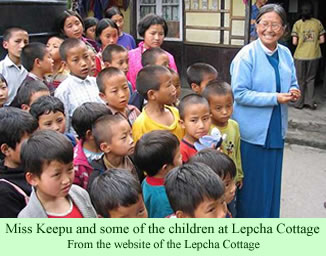Keepu Lepcha runs an orphanage in a large facility in Gangtok, the capital of Sikkim, at which about 75 Lepcha children are staying and getting an education. The Lepcha Cottage, as she calls it, is Ms. Lepcha’s way of trying to help her people.
 The 72 year old woman, who has never been married or had children of her own, is concerned about the future. “The Lepcha community is a dying race. Illiteracy and alcoholism are big problems,” she says. “A lot of children have lost both their parents due to alcoholism.”
The 72 year old woman, who has never been married or had children of her own, is concerned about the future. “The Lepcha community is a dying race. Illiteracy and alcoholism are big problems,” she says. “A lot of children have lost both their parents due to alcoholism.”
Her orphanage also takes children whose parents are both alive, but who are too poor to provide an education. She is committed to combating the decline of the Lepcha population. According to an article in IBNLive last week, their numbers have diminished to about 45,000 people. They once dominated Sikkim, but they are now a small minority population. IBNLive is an important English language news channel in India.
Keepu herself did get an education. While working in the education department, she was depressed by the plight of some of the Lepcha people. “Being a Lepcha myself and having seen the poor condition in remote areas, I felt I should definitely do something for the survival of the community,” she said.
She inherited a large home in Gangtok and decided, in 1988, to establish an orphanage in it, initially for 22 children. The Rs60,000 (US$1,200) needed to operate the facility every month comes from her own pension plus other donations. She says that she could never have helped so many children if she had had a family of her own.
A graduate 20 years ago from Lepcha Cottage, Fursong Lepcha, came to the facility when she was only six years old. Now a teacher and a mother herself, she owes everything to the home where she was raised. “My own mother who gave birth to me is in the village. But my real mother who gave me knowledge is Miss Keepu. I give this credit to Miss Keepu,” Fursong said.
Keepu quickly developed a dream of expanding her orphanage into a school, and that came to pass in 1996 when some European tourists provided financial support. Her dream now is that the orphanage and school will be able to continue after she is gone. She hopes the children who have been raised and educated there will help keep it going.
The IBNLive article is accompanied by a two minute video filmed at the school, with good English narration, showing Keepu interacting with “her” children. A lot of additional information is provided on the Lepcha Cottage website, which includes suggestions for those interested in helping support Lepcha children.